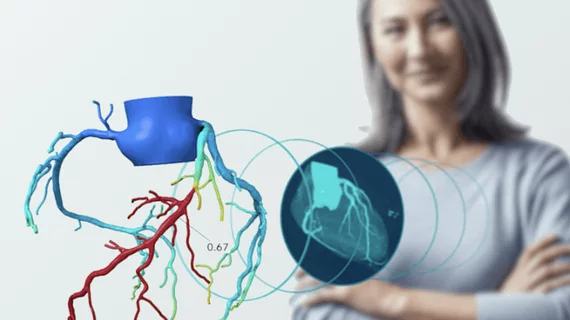AI-based CAD assessments as accurate as FFR, new 10-year study confirms
The noninvasive, artificial intelligence-based coronary artery disease (CAD) evaluations developed by HeartFlow can anticipate long-term patient outcomes as well as fractional flow reserve (FFR) assessments, according to new research published in the Journal of Cardiovascular Computed Tomography.[1]
The study’s authors tracked 156 vessels in 102 patients with stable CAD for a median follow-up period of nearly 10 years. All patients underwent coronary CT angiography (CCTA) and FFR from 2009 to 2011 as part of the DISCOVER-FLOW clinical trial. Each patient was treated with HeartFlow’s FFRCT Analysis technology, which uses advanced AI to evaluate CCTA results for warning signs of CAD.
Overall, target vessel failure (TVF) was seen in 12.8% of vessels included in the team’s analysis. Researchers concluded that FFRCT results could predict a patient’s long-term risk of TVF as well as FFR assessments, which suggests patients can receive high-quality care without undergoing invasive cath lab procedures.
“We found that vessels with FFRCT ≤0.80 had a significantly greater risk of long-term events than vessels with FFRCT >0.80,” wrote first author Seokhun Yang, MD, an interventional cardiologist with Seoul National University Hospital, and colleagues. “This finding is meaningful because the long-term prognostic value of low FFRCT beyond five years has been seldom reported. Since most patients with CAD show good prognosis with optimal medical treatment, it is clinically crucial to understand the nature of FFRCT in terms of very long-term prognostication. As a result, the clinical utilization of FFRCT will offer additional prognostic value in predicting long-term clinical outcomes alongside CCTA.”
HeartFlow issued its own statement about this new analysis, emphasizing how important it is to monitor clinical trial participants for extended periods of time.
“It’s rare to have the opportunity to follow patients for 10 years in clinical trials, and we are delighted to confirm the long-term prognostic value of FFRCT through the DISCOVER-FLOW study,” Campbell Rogers, MD, HeartFlow’s chief medical officer, said in the statement. “These data are a reflection of our commitment to providing comprehensive clinical evidence on the diagnostic accuracy, safety, efficacy, and utility of the HeartFlow Analysis.”
Click here to read the full analysis in Journal of Cardiovascular Computed Tomography, a journal published by the Society of Cardiovascular Computed Tomography.

